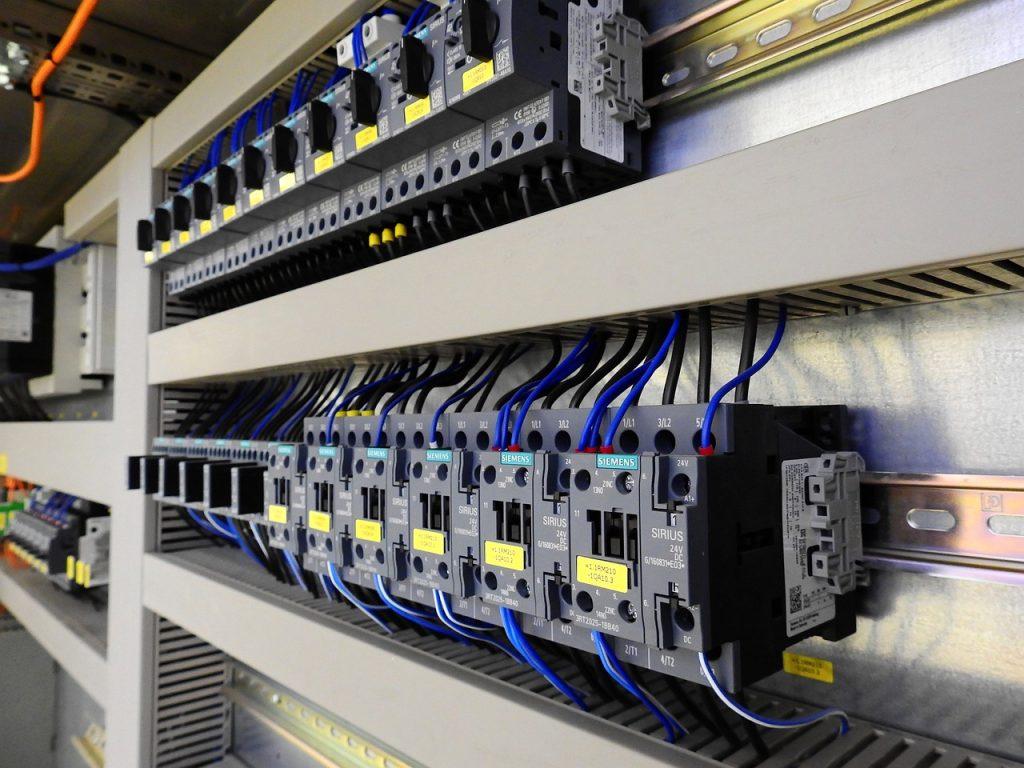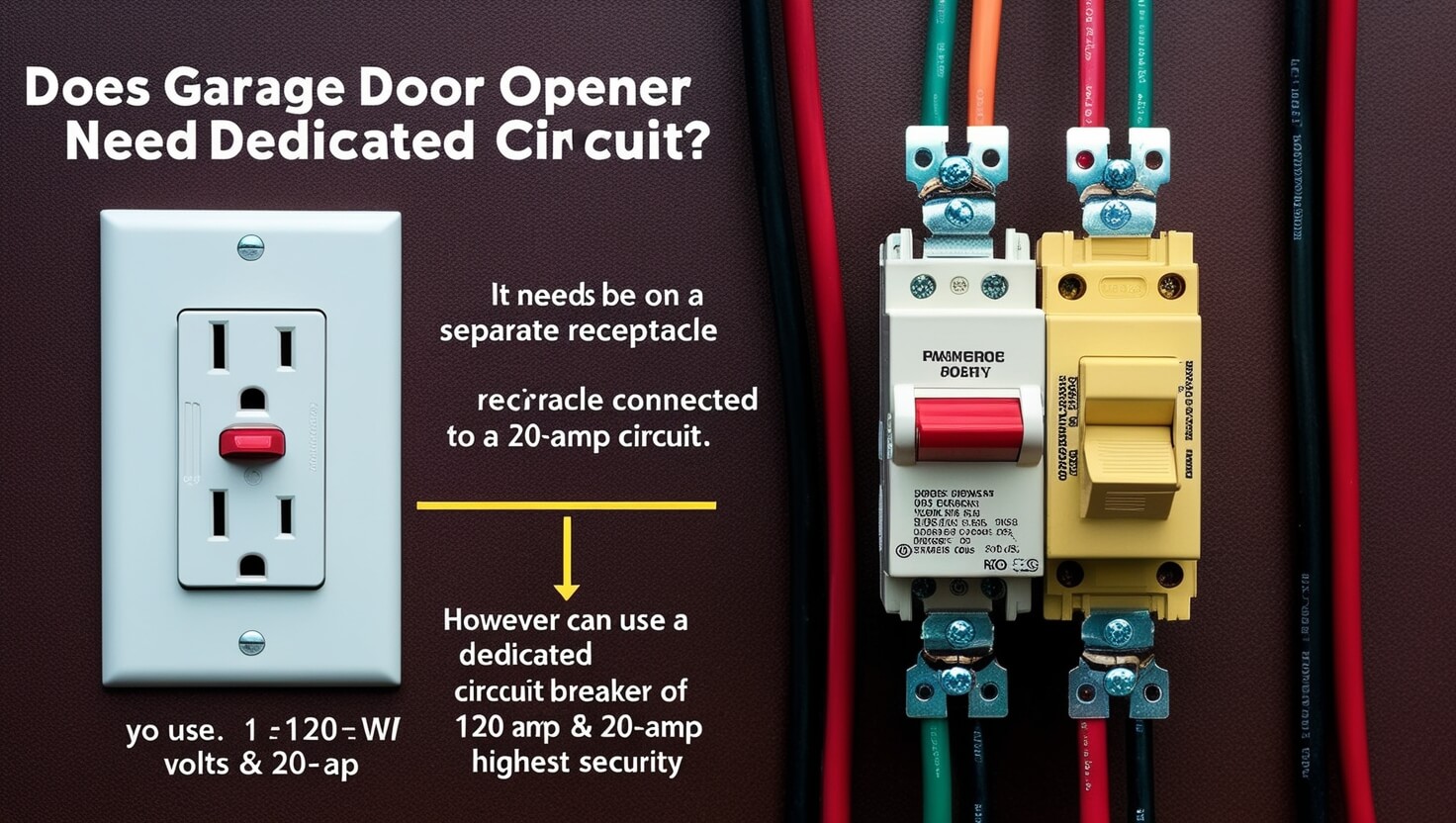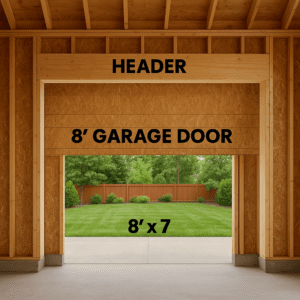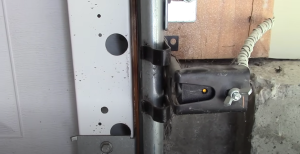The Garage Door Opener is an automated electric system. It comes with switches controlling the door and must be plugged in on a 120-volts 20-amp circuit breaker.
But it’s optional to have a dedicated circuit for every garage door opener since it uses an average amount of electricity.
So, Does garage door opener need dedicated circuit? No, it doesn’t. It needs to be on a separate receptacle connected to a 20-amp circuit. However, you can use a dedicated circuit breaker of 120 volts & 20-amp to ensure the highest security.
There are some NEC 2017 requirements for GFCI & Dedicated circuit breaker requirements for garage door openers (GDO). Today, I will explain them to inform you better.
Circuit Breaker Requirement for A Garage Door Opener
According to NEC 2017 new act, you can use a single circuit for multiple garage door openers and outlets, and it doesn’t need to be dedicated for every circuit breaker.
But the circuit breaker should be 20 amps. You cannot use a 15-amp circuit breaker based on NEC 2015.
Let’s say you have multiple garage door openers. You can use the same 20-amp circuit breaker for them all, but the lighting and GDOs cannot be on the same outlet.
And you must use a 20-ampere circuit board instead of a 15-amp.
However, using a dedicated circuit for every Garage Door Opener is a good practice. It will save your GDO from different electric hazards and ensure its safety.
Why Should You Use A Dedicated Circuit for The GDO?
You should use a dedicated circuit for three reasons.
Flawless/enough electricity, avoid electric hazard, and multi GDOs. There might be other benefits of using a dedicated circuit breaker, but these three are the core.
Let’s get each of them and see why you should go for a dedicated circuit for the garage door opener(s).
Enough Electricity
The first importance of using a dedicated circuit is ensuring enough electricity.
Mainly, a dedicated circuit breaker is responsible for providing electricity to one appliance or outlet. Therefore, it can provide more than enough electric flow to that object.
If you have a 20-amp breaker. And it is 120-volts power; in that case, the maximum watt capacity would be 120×20=2400 watts.
On the other hand, the watts requirement for a garage door opener is around 500 on average or ½ horsepower, which equals 367 watts.
If you use a dedicated circuit breaker, it will have enough to handle 3-4 GDOs together.
Avoid Electric Hazard
Another significant concern of using a dedicated circuit breaker is to avoid electric hazards.
Sometimes, the circuit breaker may be overloaded and fails to provide enough electricity to the connected cords or plugged-in devices. In that case, electric shock, burns, and such accidents might happen.
If you use a dedicated circuit breaker, you will only face such issues once the circuit breaker is damaged.
So, avoiding electrical hazards is one of the main reasons to use a dedicated circuit breaker for every garage door opener.
Safe for Multi-Door Opener
A dedicated 20-amp circuit breaker is supposed to have 2400 watts capacity. And this is equal to 5-6 GDOs capacity (if they use only 350-500 watts.
Some high-quality garage door openers might use 700-1000 watts in starting, but they will come to a regular flow only after a while.
If you consider this high-quality or robust garage door, you can still use 2-3 GDOs in one single dedicated circuit breaker.
Does A GDO Need GFCI Protection?
Yes, A Garage door opener receptacle must have GFCI protection to avoid any electrical hazards and maintain minimum safety.
Basically, a GDO can be used in a shared circuit breaker. Still, the receptacle outlet must have GFCI protection.
A GFCI protection saves your appliance and body from sudden electrical shock. Let’s say you’ve plugged in your garage door opener, and some water is already inside.
In that case, the opener will experience an electrical shock, as you can feel them.
Although the dedicated circuit has options, the GFCI is a must. You must recognize the GFCI protection, even for a dedicated circuit breaker.

FAQs
01. Can You Use The Same Circuit Breaker for Both GDO & Garage Lightening?
No, you cannot use the same circuit breaker for both GDO & garage lighting because it violates NEC 2017 act.
According to tit hat act, you can use the same circuit breaker for multiple garage doors or appliances, but it can’t have any lightning.
02. What’s The NEC Code for GDO?
The NEC code for the garage door opener is a 120-volt 20-amp circuit breaker since a 20-amp circuit will be enough to ensure a secure electric flow to multiple devices or outlets.
Even a single garage door opener must be in a 20-amp dedicated circuit breaker.
03. Is 15 AMP Circuit Breaker Safe for Garage Door Openers?
The 15-amp circuit breaker was safe for garage doors until 2017.
In recent years, the garage door circuit breaker must be 20-amp. It’s the updated requirement for any garage door opener with 2409 watts max capacity.
04. Should You Use GFCI Circuit for GDO?
Of course, you should use the GFCI circuit for the garage door opener.
This certification will protect your GDO or any other electronic device from unwanted electric shock.
Even it will be a proven certification of water that cannot damage your system.
Final Verdict
When people ask, Does the garage door opener need a dedicated circuit? The answer is a straight no. You can use a shared circuit breaker with 120 volts and 20 amps.
However, the receptacle must be GFCI-certified. Otherwise, it will violate the NEC 2016 act, and you cannot claim a regular warranty.




